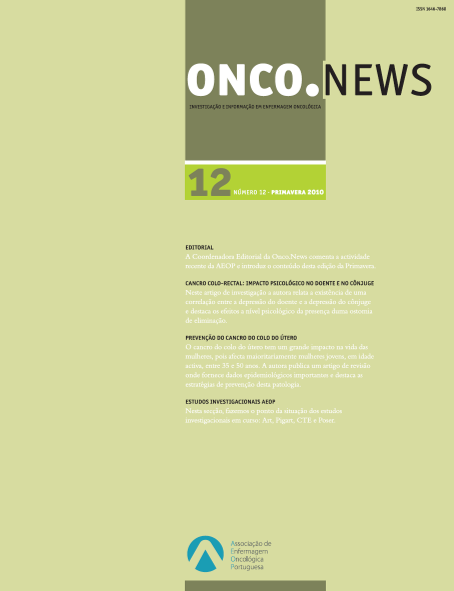Colorectal Cancer: Psychological Impact on Patient and Spouse
DOI:
https://doi.org/10.31877/on.2010.12.01Keywords:
Colorectal cancer, depression, ostomyAbstract
The current study assesses the impact of treatment by means of surgery, surgery/chemotherapy and surgery/radiotherapy in patients with colorectal cancer and their respective spouses, concerning depression, anxiety and post-traumatic stress. Data was gathered at the Portuguese Institute of Oncology, using a sample composed of 114 patients diagnosed of colorectal cancer and 67 spouses of such patients.
This study has shown a positive correlation between patients’ depression status and that of their spouses. We’ve also demonstrated that an elimination ostomy brings physical benefits to the patient, yet significantly increases the risk of depression, anxiety and post-traumatic stress.
Downloads
References
ANDRYKOWSKI, A. & CORDOVA, J. (1998). Factors Associated with PTSD Symptoms Following Treatment for Breast Cancer: Test of the
Andersen Model. Journal of Traumatic Stress. nº 11: 189-203.
BIBBINGS, J. (1998). Upper Gastrointestinal Tract Tumours. In V. TSCHUDIN. Nursing the Patient With Cancer. New York. Prentice Hall,
- 205.
BECK, A.; WARD, C.; MENDELSON, M.; MOCH & ERBARGL. (1961). An inventory for Measuring Depression. Artchives of general Psychiatry,
-571.
BLANCO, A.; ANTEQUERA, R. & AIRES, M. (2002). Percepción Subjectiva del Cáncer. In M. Dias & E. Durá. Territórios da Psicologia Oncológica.
Lisboa. Climepsi: 547 a 578.
BISHOP, G. (1994). Healt Psycology:Integrating Mind and Body. Boston. Allynand Bacon.
BLANCHARD, C.; ALBRECHT, T.& RUCKDESCHEL, J. (1997). The Crisis of Cancer: Psychological Impact on Family Caregivers. In Oncology. nº
: 189 a 194.
CAMDESSUS, B. (1989). Les crises familiares du Grand Age. Paris. ESF.
CAVANAUGT, A. (1983). The Prevalence of Emotional and Cognitive Dysfunction in a General Medical Population using the MMSE, GHQ
and BDI. General Hospital Psychiatry, 5, 15-24.
COUVREUR, C. (2001). A Qualidade de Vida : Arte para Viver no Século XXI. Loures. Lusociência.
DEROGATIS, L.; MORROW, G.; FETTING, J.; PENMAN, D.; PIASETSKY, S.; SCHMALE, A.; HENRICHS, M. & CANEICKE, C. (1983). The Prevalence
of Psychiatric Disorders Among Cancer Patients. Journal of the American Medical Association, 249, 751-757.
FIGUEIREDO, A.; FERREIRA, L. & FIGUEIREDO, P. (2001). Impacto Psicosocial do Cancro da Mama na Mulher. Enfermagem Oncológica. Porto. nº 17: 22 a 27.
GARCIA, I.; WAX, P. & GHWRTZMANN, F. (1996). Aspectos Psicossociais do Paciente com Cancer. In A. Murard & A. Katz.. Bases Clínicas do
Tratamento. Rio de Janeiro. Guanabara Koogan. 125-131.
GELDER, M.; GATH, D.; MAIOU, R. & COWEN, P. (1996). Oxford Texboob of Psychiatry. New york. Oxford University Press Inc. 385-388.
GOUVEIA, J. ANTÓNIO, M. & VELOSO, V. (1993). Registo Oncológico Nacional. Porto. I.P.O.
GRIFFIN, C. (1998). Lower Gastrointestinal Tract Tumours. In V. TSCHUDIN. Nursing the Patient With Cancer. New York. Prentice Hall.
-232.
HACPILLE, L. (2000). A Dor Cancerosa e seu Tratamento. Abordagem em Cuidados Paliativos. Lisboa. Instituto Piaget.
HARRISON, J. & MAGUIRE, P. (1994). Predictors of Psychiatric Morbility in Cancer Patients. British Journal Psychiatric., 165, 593-598.
HOLLAND, J.; SILBERFARB, P. TROSS, S. & CELIA, D. (1986). Psychosocial Research in Cancer: The Cancer and Leukemia Group B. In V.
Ventafridda. Assessment of Quality of Life na Cancer Treatment. Amsterdão. Experta Medica. 89-101.
HUGHS, J. (1987). Cancer and Emotion: Psychological Preluds and Reactions to Cancer. Chichester. John Willey & Sons.
KISSANE, D. & BLOCH, S. (1994). Grief. In S. BLOCH; J. HAFNER; E. HARAI & G. SZMUKLER. (Eds). The Family in Clinical Psychiatry. Oxford.
Oxford University Press.
KUBLER-ROSS, E. (1994). Sobre la Muerte y los Moribundos. Barcelona. Grijalbo.
LOPES, M. (1997). A Integração do Doente Oncológico no seu Meio Bio-sócio-familiar. Problemas mais Frequentes no Doente Oncológico
Pós-alta. Lisboa. Nº 28.
MAGUIRE, P. (1994). ABC of Brest Diseases. Psicological Aspects. British Medical Journal. nº 309: 1649 a 1652.
MURARD, A. (1996). Câncer Anal. In MURARD, A. & KATZ, A. Oncologia. Bases Clínicas do tratamento.. Rio de Janeiro. Guanabara koogan:
a 181.
NORDIN, N. & GLIMELIUS, B. (1999). Predicting Delayed Anxiety and Depression in Patients with Gastrointestinal Cancer. Journal of
Cancer: Cancer Research Campaingn. 525-529.
NORRIS, F. (1992). Epidemiology of Trauma: Frequency and Impact of Different Potentially Traumatic Events on Different Demographic
Groups. Journal of Consulting and Clinical Psycology, 60, 409 - 418.
OGDEN, J. (1999). Psicologia da saúde. Lisboa. Climepsi.
PASSIK, S. & GRUMMON, L. (1998). Post Traumatic Stress Disorder. In J. Holland. Handbook of Psychooncology. New York. Oxford University
Press. 595-607.
RESNHCK, H.; KILPATRICK, D.; DANSKY, B. & BEST, C. ( 1993). Prevalence of Civilian Trauma and Posttraumatic Stress Disorder in
a Representative National Sample of Women. Journal of Consulting and Clinical Psychology, 61, 984-991
ROTH, A. & BREITBART, W. (2001). Principles of Psychosocial Oncology. In P. Rubin. Clinical Oncology: A Multidisciplinary Approach for
Physician na Students. New York. Sanders. 220-238.
SANTOS, Z. (1995). Reacções Emocionais e Apoio Psicológico ao Doente com Doença grave. Cuidar, 2, 3-7.
SOBRAL, Z. (1987). Adaptação Psico-social do Doente Oncológico. In Divulgação. nº 3: 5 a 7.
SPIELBERGER, C. GORUCH, R. LUSHENE, R. VAGG, P. & JACOBS, G. (1983). Manual for the State-trait Anxiety Inventory, (form Y), Self
Evaluation Questionnaire. Consulting Psychologists Press, Inc.
STEDEFORD, A. (1986). Encarando a Morte: Uma Abordagem ao Relacionamento com o Paciente Terminal. Porto Alegre. Artes
Médicas.
TWYCROSS, R. (2001). Cuidados Paliativos. Lisboa. Climepsi Editores.
WEISS, D. & MARMER, C. (1997). The Impact of Event Scale – Revised. J. Wilson & Teane (Eds). Assessing Psychological Trauma and PTSD.
New York. Guildford.
WEIHS, k. & REISS, D. (1996). Family Reorganization in Response to Cancer: A Developmental Perspective. In BAIDER, L.; COOPER, C. &
DE-NOUR, A.; Cancer and Family. Chichester. Wiley: 3 a 29.
WEITZNER, M. JACOBSEN, P. WAGNER, H. FRIEDLAND, J. & COX, C. (1999). The Caregiver Quality os Life Index – Cancer (CQOLC) Scale:
Development and Validation of na Instrumrnt to Measure Quality of Life the Family Caregiver of Patients with Cancer. Quality os Life
Research. nº 8: 55 a 63.
Downloads
Published
How to Cite
Issue
Section
License
Copyright (c) 2023 Ana Paula Figueiredo

This work is licensed under a Creative Commons Attribution-NonCommercial-ShareAlike 4.0 International License.




